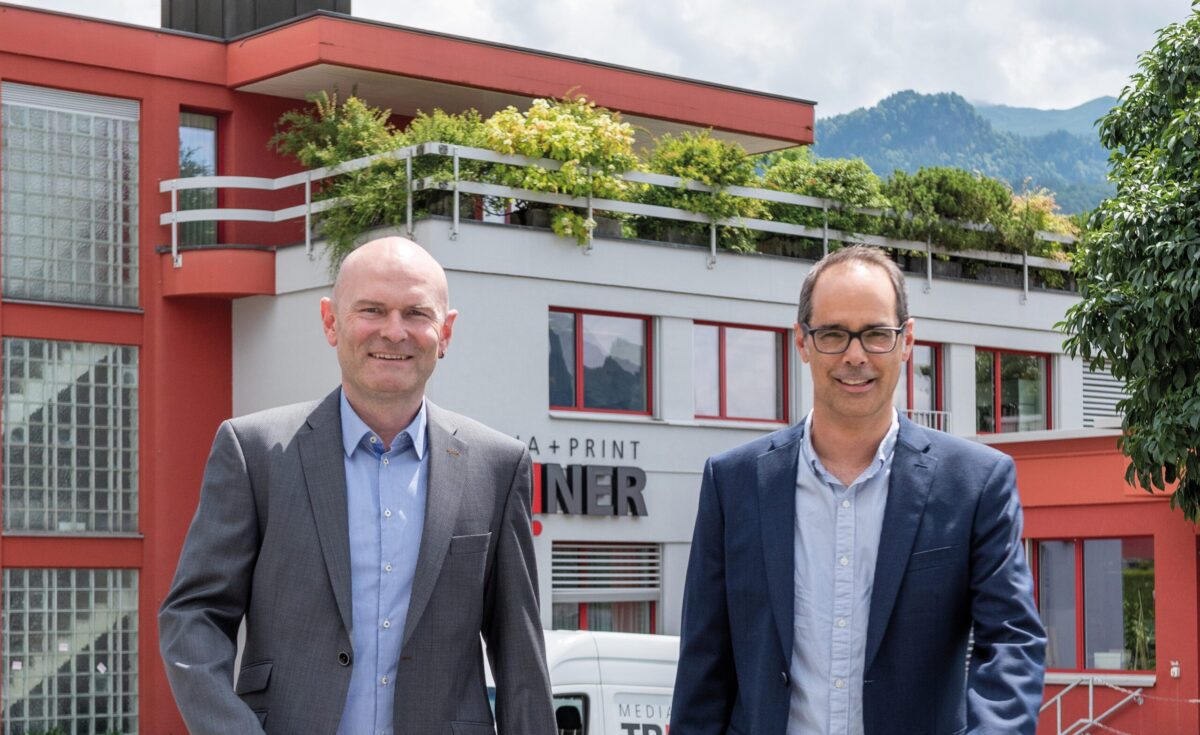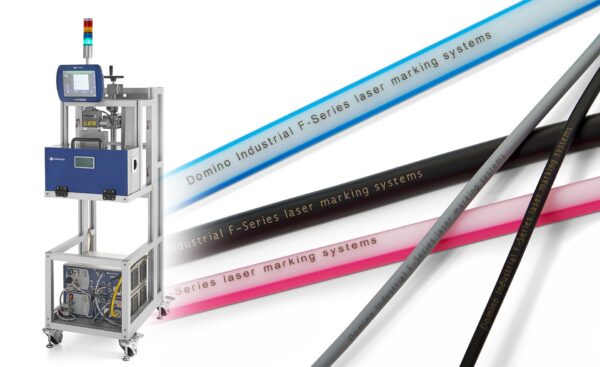Since July 1, Triner Media + Print has had a new management team, more precisely the two managing directors Michael Heinzer and Simon Loretz. Our magazine spoke to the two of them about how they see the future of the company and the future of the media services business in general. This in an environment where the local connection continues to play a major role.
Text: Paul Fischer / Image: Triner Media + Print
Triner Media + Print and its sister company "Bote der Urschweiz" have over 160 years of history behind them. It is worth taking a look back: in 1858, Kaspar Triner founded a company for the "production of printing work of all kinds in black and color for authorities, associations, business people and private individuals". The newspaper "Bote der Urschweiz" is added. At the time, it was advertised as follows: "The only newspaper in the original cantons to be served by the Swiss Telegram Agency, and therefore demonstrably unsurpassed in this region in the rapid transmission of the latest news".
It's amazing: many statements about target groups or the basic orientation of the Trin media companies are still similar in 2021 as they were back then. Of course, the environment has changed a lot since then. Highlights of the past decades: in 1974, the company moved to the Schmiedgasse site; in 1984, Hugo Triner took over the long-standing family tradition; in 2002, the newspaper and print shop were split into two companies, creating Druckerei Triner with Peter H. Kuster as Managing Director. 2010 Succession planning in the print shop through a management buy-out. 2016 The company starts with a purely "digital" team that focuses on web and social media; in the same year, Druckerei Triner is transformed into Triner Media + Print. Adrian Steiner became Chairman of the Board of Directors in 2019 and Michael Heinzer and Simon Loretz succeeded Peter Kuster at Triner Media + Print in 2021. Both the "Bote der Urschweiz" and Triner Media + Print are independent companies, each with its own accounts. However, they share central services such as controlling, human resources and others. Of course, services are also invoiced to each other. In terms of printing, Media + Print is "only" responsible for commercial printing. Newspaper printing is carried out at the "Boten der Urschweiz" printing center in Seewen. Together, the two companies have a good 100 employees.
The legal "building block" that holds everything together is the media foundation established in 2014. Its primary purpose is the long-term preservation of the "Bote der Urschweiz" (since 2014 there has been a cooperation with the "Luzerner Zeitung") and to secure as many jobs as possible in the Schwyz region. While the "Bote der Urschweiz" is 100% owned by Hugo Triner and the foundation, their share in Triner Media + Print is only 35%. The remaining 65% belongs to the management. However, anyone who leaves the company must return their shares.
Why two managing directors?
First of all, we should briefly introduce the two managing directors. Michael Heinzer completed his apprenticeship at Triner as a polygrapher. He later completed an apprenticeship as a printer. In other words, he is a "Swiss native"! In the course of his career, he became self-employed and took over a small print shop in the Schwyz region. He and his old employer often "got in each other's way". In 2004, he sold his company to Hugo Triner and returned to it. In 2010, he participated in the Managemet buy-out. Simon Loretz is a trained printer, worked in various print shops and ended up at Calendaria AG in December 1999, where he remained for around 17 years in various positions and activities. In 2017, he moved to Triner Media + Print as Head of Sales and Marketing.
So how did this constellation come about? Simon Loretz on the background: "We got to know each other during an NDS and decided to complete the Skugra business management course together. This also resulted in a personal friendship. Even back then, during the Skugra course, we gained insights into other companies. I was fascinated by the long-term approach to planning and management at the Triner companies. I thought to myself: I would also like to work here one day. And it actually worked out four years ago." Michael Heinzer says: "I'm a Triner veteran, so to speak, and have been with the company for many years. Simon and I have been in close private contact since we did the Skugra training together. It was very helpful for us to share our experiences across the borders of two different companies. When he joined us in 2017, it soon became clear to both of us that we wanted to take on the question of a succession plan for Peter Kuster together." Simon Loretz: "I think we make a good team and complement each other. We have long been convinced that media service providers in particular can only cope with the structural change that can be observed in this market if managers and employees act as a strong, united team. Lone wolves or autocratic structures are no longer appropriate today."
And the Board of Directors had no reservations about this solution? Michael Heinzer: "On the contrary, they were already moving away from traditional hierarchical structures after the management buy-out in 2010. The idea that Simon and I could take on the job together was a good one from the outset; they simply wanted to make sure that this concept would actually work in reality and naturally scrutinized our plans carefully. The Board of Directors commissioned the SME Succession Center to carry out an assessment and received confirmation."
Being pragmatic
Michael Heinzer and Simon Loretz officially took up their posts at the beginning of July. The environment is exciting, but not a walk in the park. On the one hand, of course, there is the structural change, and on the other, the ongoing Covid pandemic is making day-to-day business life more difficult, even if circumstances have returned to normal somewhat. The two and their team have one advantage: they work for a company where the term "local hero" is absolutely apt.
Michael Heinzer: "The majority of our customers come from Schwyz and the surrounding region. Triner Media + Print has a strong market position there. Be it with our own services or in cooperation with the services of 'Boten der Urschweiz'. And what about digital versus print media consumption? Simon Loretz: "We have been operating for five years with a team of specialists focused on digital needs. Our philosophy is clear: if the customer wants a media mix with a strong emphasis on print, then that's what we offer. But we also support our customers with services if they want pure social media campaigns. We also make no distinction between large and small companies, we are very pragmatic." Michael Heinzer: "Of course, print communication is even more important here in Schwyz than in a highly urbanized environment. You can see that with the 'Boten der Urschweiz'; the printed newspaper is still valued across the population as a local information and communication medium. But here too, more and more commercial SMEs are turning to cross-media and social media in particular. If you need a partner, then we are of course the first port of call as a well-known local media service provider."
Simon Loretz adds: "Regardless of the question of the media channel, there is still a sense of togetherness in the Schwyz region. The argument 'buy and source your products and services in the region' still counts. I live privately in the canton of Lucerne, around half an hour's drive away, and things are already very different there. But of course we can only deliver the 'At home in Schwyz' message if we do a good job and offer the right value for money and the right services. The pigeons don't fly to us, but we have to work just as hard as others for their success!"

Thoughts on leadership and corona
The two managing directors have already mentioned it in conversation: companies with a Triner Media + Print focus should position themselves as a strong team. Michael Heinzer therefore also sees an important role model function in the two-man management team: "If we demand team performance from our employees, then we both have to set an example. As a team, you are simply stronger, Simon and I are convinced of that." And how has the pandemic affected the business? Simon Loretz: "Thanks to our broad positioning and our local and regional roots, we have come through the last few months relatively unscathed. For example, where restaurants had to close for months, butchers were able to benefit with their home delivery service. There have been many losers in this pandemic, but also winners, who have done business like never before. But we also had to introduce short-time working in the first phase. But that has been over for some time now."
Michael Heinzer and Simon Loretz are convinced that the pandemic will also leave its mark in the long term, especially in the areas of leadership and organization. Michael Heinzer: "Team-oriented leadership only works with mutual trust. The effects of corona have clearly strengthened this in our company. Due to the pandemic regulations, we also introduced working from home to an extent that we would not have thought possible before. With the experience we have gained and the technical aids that are available, all employees can now work from home, with the exception of those working on heavy technology, of course. We have therefore decided that we will not return to the status quo of February 2020. Our prepress and office staff will also be able to work from home for two days in future - all in close consultation with the team, of course.
However, there is no compulsion; anyone who wants to be in the office all the time can do so." Simon Loretz sees the situation in a different light: "Working from home is certainly here to stay, many employees want to do so, and not just in our industry, because it has its advantages. But it should be a sensible mix. Perhaps one third home office, two thirds on-site office - that's how we want to implement it. But I'm also noticing a certain amount of home office fatigue. In sales in particular, people want to get back to the customer. We have maintained our sales activities throughout the pandemic and sought contact with customers by phone and video call. We can feel this in our incoming orders. But selling via Zoom or Teams - that won't be a successful recipe in the long term! Our customers appreciate direct and personal contact."








